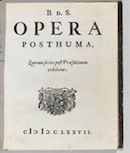
Selection from –Political Treatise - Chapter VIII, of aristocracy
Spinoza's Words – (of the formation and operation of two councils of patricians to rule the state)
 So far of monarchy. But now we will say, on what plan an aristocracy is to be framed, so that it may be lasting. We have defined an aristocratic dominion as that, which is held not by one man, but by certain persons chosen out of the multitude, whom we shall henceforth call patricians.
So far of monarchy. But now we will say, on what plan an aristocracy is to be framed, so that it may be lasting. We have defined an aristocratic dominion as that, which is held not by one man, but by certain persons chosen out of the multitude, whom we shall henceforth call patricians.
Spinoza calls these patricians chosen but does not specify who does the choosing. He says that out of a 100 perhaps 2 or 3 will have the capacity to govern well. Factions will form. Patricians will certainly endeavour to secure their succession to their children or next in blood and thus will be able to prepare the way to a monarchy.
But if the group of patricians is large the power of each member is reduced and although they may make the law with no consultation with the multitude nevertheless the multitude is a cause of fear to the rulers, and therefore succeeds in retaining for itself some liberty, which it asserts and holds as its own, if not by an express law, yet on a tacit understanding.
But the commons need not apprehend any danger of a hateful slavery from this form of dominion, for the will of so large a council cannot be so much determined by lust as by reason.
Spinoza suggests that in the governing council the number of members should be proportional to the number of citizens; about 1 patrician to 50 citizens; that the seats not be hereditary; that all council members should be over 30 years of age; and that all the patricians must be assembled at certain fixed times in a particular part of the city, and that whoever does not attend the council, unless he be hindered by illness or some public business, shall be fined some considerable amount. For, were it otherwise, most of them would neglect the public, for the sake of their own private affairs.
Concerned that the large council of patricians will not do their job properly Spinoza proposes a second council whose only duty is to see that the constitution, as far as it concerns the councils and ministers of the state, be kept unbroken, and who should, therefore, have authority to summon to judgment and, in conformity with established law, to condemn any delinquent who, as a minister of the dominion, has transgressed the laws concerning his office. And these patricians we shall hereafter call syndics. They must be over 60 and chosen for life.
The rest of the Chapter is given over to a detailed account of how these two councils are to function and rule the state including permanent public shame for those patricians who do not do their duty.
NOTE: Spinoza devotes two more chapters to a discussion of how a government by councils of patricians would work. We will skip over them as not informative to today's world. The next and last chapter of the book is on democracy and it is unfinished.